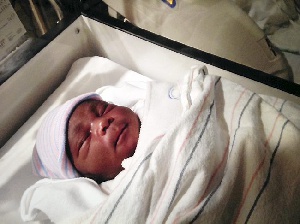Ghana commemorated World Prematurity Day yesterday with the revelation that 140,000 children are born premature in Ghana annually. Out of that number, 29,000 die per year.
A media engagement held to sensitise the general public about the issue saw the participation of all relevant stakeholders to deliberate on the theme ‘Born too Soon, Born too small: Help us live’.
Speaking on the situation, Dr Isabella Sagoe-Moses, Deputy Director, Reproductive and Child Health, Ghana Health Service, stated that preterm births were the third highest cause of neonatal deaths in the country.
According to her, this was because little attention was paid to it hitherto.
“With the launch of a strategic plan for newborn care last year, things will take a better turn,” she held.
Per her estimation, the strategic plan for newborn care, which was launched last year, will serve as a roadmap to reduce neonatal deaths by 2018.
Touching on what preterm babies are, she said that they are babies born before 37 weeks.
“Preterm becomes an issue because babies are not fully developed to adapt to their new environment,” she stressed.
She detailed that their immune system is not strong to fight infections; they have feeding difficulties and breathing issues as well.
However, she said with the proper care, these preterm children could survive and live healthy lives.
The Deputy Director enumerated early pregnancies and very late pregnancies as risk factors of preterm births. Others, according to her, are chronic illness affecting the mother, hypertension and other infections that come about during pregnancy.
She seized the opportunity to advice women not have babies too early or too late, and also take antenatal care seriously since issues that may expose mothers to have preterm kids can be detected and addressed.
The UNICEF Chief of Health and Nutrition, Dr Victor Ngongalah, reiterated the need to create more awareness about neonatal deaths to reduce the number of deaths.
According to him, with improvement and advances in science and medicine, there is great hope to ensure that preterm does not become an issue.
“Globally, out of 2.9 million newborn deaths reported annually, deaths from complications of preterm births account for more than 1 million of these deaths,” he added.
He was hopeful that with the adoption of the Sustainable Development Goals by various countries, governments would be committed to ending preventable newborn deaths.
Dr Ebenezer Badoe, President of Paediatric Society of Ghana, noted that children have a right to the best start in life, and it is our responsibility to save them to become healthy and product citizens of the country.
“The Paediatric Society is urging the Ghanaian society to demand better maternal and newborn healthcare and a supportive environment for the rights of women and young children,” he added.
Health News of Wednesday, 18 November 2015
Source: thefinderonline.com













